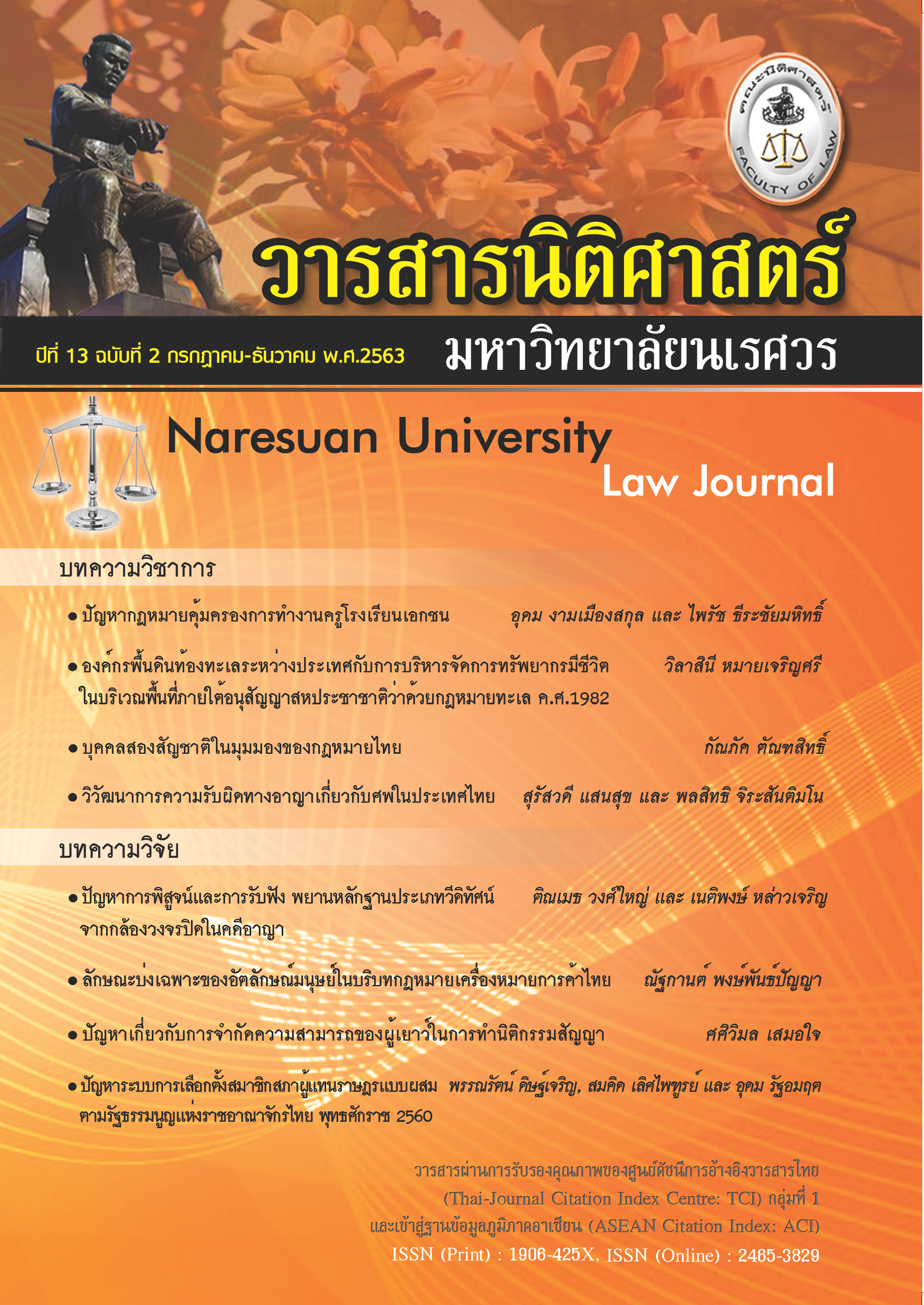Problems of the Mixed–Member Electoral System of the House of Representatives under the Constitution of the Kingdom of Thailand B.E. 2560 (2017)
Main Article Content
Abstract
The Constitution of the Kingdom of Thailand B.E. 2560 (2017; The Constitution) provides that members of the Thai House of Representatives are elected by a single ballot mixed-member apportionment system. After the Organic Act on Election of Members of the House of Representatives B.E. 2561 (2018) was promulgated and the first election was held on 24 March 2019, we found multiple factual and legal problems. Especially the method of house of representative recruitment, voting, election calculating, and candidate eligibility. The results suggest that the mixed-member system need to be developed, Germany’s MMP system might be adopted with two ballots for each member election, with one vote for preferred candidates while the second is for a party, another option would be to use a majority system for constituency candidate counting and proportional representative system for party-list candidate counting with compensations in case of overhang seats. To receive party-list seats, a party must have the votes above the average votes per House of Representatives member. A further solution might be to amend candidate qualifications as voters by setting a higher threshold, including Thai nationality, age of at least 25 years old on Election Day, and no political party membership. These reforms would lead to a fair mixed-member system for the House of Representatives, genuine popular representation, and government stability as solutions for Thai political system problems corresponding to “The Significant Principles of House of Representatives Elections”.
Article Details
References
Balinski, M. L. Balinski, and H. P. Young. “The Webster Method of Apportionment.” Proceedings of the National Academy of Sciences of the United States of America 77, no.1 (1980): 1-4.
Banjerd Singkaneti. Fundamental Principles of Rights, Freedoms and Human Dignity. 6th ed. Bangkok: Winyuchon, 2562. [In Thai]
Chaowana Trimas. “The Electoral System in the Constitution of Thailand.” Constitutional Court Journal 2, no.4 (2000): 49 - 69. [In Thai]
Chinthip Yutthangkoon. “The German Proportional Electoral System.” Master’s thesis, Graduate School Chulalongkorn University, 1992. [In Thai]
Farrell, David M. Electoral Systems: A Comparative Introduction. 2nd ed. London: Red Globe Press, 2011.
Kramol Tongdhamachart, Somboon Suksamran, and Pricha Hongskrailers. Election, Political Party and Government Stability. Bangkok: Masterpress, 1988. [In Thai]
“‘Media’ Prohibited Careers for Politics.” Thansettakit, May 5-8, 2019, 16. [In Thai]
Meechai Ruchupan. ““Meechai” Presents 7 Advantages of the New Election System and Has Ready to Solve Weakness Problems.” Accessed July 25, 2019. https://www.iqnewscenter.com. [In Thai]
Neblo, Michael A. Deliberative Democracy between Theory and Practice. Cambridge: Cambridge University Press, 2015.
Office of the Royal Society. “The Royal Institute Dictionary B.E. 2011.” Accessed July 25, 2019. https://dictionary.orst.go.th. [In Thai]
Phannarat Ditcharoen. “Legal Measures for Strengthening Democracy to Political Party.” Master’s thesis, Faculty of Law, Thammasat University, 2012. [In Thai]
Phannarat Ditcharoen. “The Mixed-Member Electoral System for the House of Representatives under the Constitution of the Kingdom of Thailand B.E. 2560.” Doctoral dissertation, Faculty of Law, Thammasat University, 2019. [In Thai]
Thanikan Palakawong Na Ayutthaya. “Problems on the Electoral System in the Constitutional of Thailand.” Master’s thesis, Faculty of Law Thammasat University, 2009. [In Thai]
“The PPRP Called on the 19 Coalition Parties to Prepare a Draft of the Policy Statement.” Thairathonline. Accessed March 12, 2020. https://www.thairath.co.th. [In Thai]
Trefs, Matthias. “Voter Confusion in German Federal Elections: The Baden-Württemberg Electoral System as a Possible Alternative.” German Politic 12, no.3(2003): 82-106.
Wuttisan Tanchai, and Satithorn Thananitichote. A People-Centered Voting Model. Bangkok: King Prajadhipok’s Institute, 2516. [In Thal]


